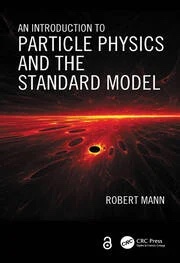
|
FreeComputerBooks.com
Links to Free Computer, Mathematics, Technical Books all over the World
|
|
- Title: An Introduction to Particle Physics and the Standard Model
- Author(s) Robert Mann
- Publisher: CRC Press; 1st edition (November 18, 2009); eBook (Creative Commons Licensed, 2010)
- License(s): Creative Commons License (CC)
- Hardcover: 614 pages
- eBook: PDF and Read Online
- Language: English
- ISBN-10: 0415573513
- ISBN-13: 978-0415573511
- Share This:

|
This book familiarizes readers with what is considered tested and accepted and in so doing, gives them a grounding in particle physics in general. It takes an historical approach showing how the model is linked to the physics that most of us have learned in less challenging areas.
About the Authors- N/A
- Physics, Computational Physics, and Mathematical Physics
- Calculus and Mathematical Analysis (Real Analysis, Functional Analysis, etc.)
- Computational and Algorithmic Mathematics
 Similar Books:
Similar Books:
-
 Group Theory for the Standard Model of Particle Physics and Beyond
Group Theory for the Standard Model of Particle Physics and Beyond
This book explores the use of symmetries through descriptions of the techniques of Lie groups and Lie algebras. It develops the models, theoretical framework, and mathematical tools to understand these symmetries.
-
 Gauge Theories in Particle Physics: A Practical Introduction
Gauge Theories in Particle Physics: A Practical Introduction
Offers an accessible and practical introduction to the three Gauge Theories in the Standard Model of particle physics: quantum electrodynamics (QED), quantum chromodynamics (QCD), and the Glashow-Salam-Weinberg (GSW) electroweak theory.
-
 The Science and Technology of Particle Accelerators
The Science and Technology of Particle Accelerators
Providing integrated coverage of accelerator science and technology, this book presents the fundamental concepts alongside detailed engineering discussions and extensive practical guidance, including many numerical examples.
-
 The Feynman Lectures on Physics (Richard P. Feynman, et al.)
The Feynman Lectures on Physics (Richard P. Feynman, et al.)
Ranging from the most basic principles of Newtonian physics through such formidable theories as general relativity and quantum mechanics, Feynman's lectures stand as a monument of clear exposition and deep insight.
-
 The Physics of Quantum Mechanics (James Binney, et al.)
The Physics of Quantum Mechanics (James Binney, et al.)
This book aims to give students a good understanding of how quantum mechanics describes the material world. It shows that the theory follows naturally from the use of probability amplitudes to derive probabilities.
-
 Principles of Mechanics: Fundamental University Physics
Principles of Mechanics: Fundamental University Physics
This textbook takes the reader step-by-step through the concepts of mechanics in a clear and detailed manner. Many proofs and examples are included to help the reader grasp the fundamentals fully, paving the way to deal with more advanced topics.
-
 Structure and Interpretation of Classical Mechanics
Structure and Interpretation of Classical Mechanics
This innovative textbook concentrates on developing general methods for studying the behavior of classical systems. It focuses on the phenomenon of motion and makes extensive use of computer simulation in its explorations of the topic.
-
 Variational Principles in Classical Mechanics (Douglas Cline)
Variational Principles in Classical Mechanics (Douglas Cline)
This book introduces variational principles and their application to classical mechanics. The relative merits of the intuitive Newtonian vectorial formulation, and the more powerful variational formulations are compared.
-
 The Key to Newton's Dynamics (J. Bruce Brackenridge)
The Key to Newton's Dynamics (J. Bruce Brackenridge)
This book clearly explains the surprisingly simple analytical structure that underlies the determination of the force necessary to maintain ideal planetary motion, sets the problem in historical and conceptual perspective, showing the works of both Descartes and Galileo.
-
 Statistical Mechanics of Lattice Systems: Mathematical Introduction
Statistical Mechanics of Lattice Systems: Mathematical Introduction
This motivating textbook gives a friendly, rigorous introduction to fundamental concepts in equilibrium statistical mechanics, covering a selection of specific models, including the Curie–Weiss and Ising models, the Gaussian free field, etc.
-
 Relativity: The Special and General Theory (Albert Einstein)
Relativity: The Special and General Theory (Albert Einstein)
The great physicist himself disclaimed this exclusionary view, and in this book, he explains both theories in their simplest and most intelligible form for the layman not versed in the mathematical foundations of theoretical physics.
-
 An Advanced Course in General Relativity (Eric Poisson)
An Advanced Course in General Relativity (Eric Poisson)
Focusing on conceptual clarity, he derives all the basic results in the simplest way, taking care to explain the physical, philosophical and mathematical ideas at the heart of "the most beautiful of all scientific theories".
-
 Quantum Computing Since Democritus (Scott Aaronson)
Quantum Computing Since Democritus (Scott Aaronson)
This book takes readers on a tour through some of the deepest ideas of maths, computer science and physics. Full of insights, arguments and philosophical perspectives, the book covers an amazing array of topics.





